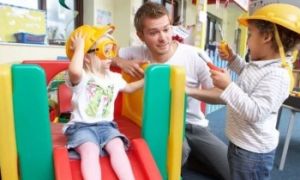Time and again, meaningful friendships have been linked to positive life outcomes. However, in early childhood, peer connections become even more important since it is while playing with each other that the most joyful learning happens. The following article provides information on early childhood friendships, their benefits and how educators can support children to develop and maintain them.
Benefits Of Friendships In Early Childhood
By making and maintaining friendships, young children:
- Learn social skills - As children interact and play with peers, they learn how to share, take turns, negotiate, make plans and solve problems. These are all key social skills that prove useful when later children enter formal learning contexts like schools and grow up to form adult relationships.
- Get emotional support - The older children grow, the more they come to depend on peers and friends for support and understanding. Indeed, friends can even provide help and acceptance in a way parents cannot because the latter are separated by generational distance, roles and expectations. Though parents and caregivers still make up the main support system for young children, having their friends around can help them with big life changes and transitions, such as welcoming a sibling or toilet training.
- Develop emotional learning - Making friends help children to develop emotional intelligence as well. They are more likely to feel empathy or concern for their friends and successful read their body language as compared to peers they may have just met.
- Learn respect for diversity - This capacity for being empathetic is a great way to build respect for diversity. As children explore how another person may feel and behave in a given situation, they are better able to understand the commonalities that underpin all humanity. At the same time while playing and having fun with children from a diverse range of cultures and backgrounds, children acquire an early appreciation of diversity and accept others.
- Develop self-esteem - Finally, when children have strong friendships with their peers, they are likely to have greater self-confidence. Being accepted and valued in play by someone else makes a child feel good about him/herself and this contributes to higher self-esteem.
Stages Of Social Skills Development
Babies are not born with the ability to make friends. The interest in peers develops over time, each stage marking a different level of interaction that children are comfortable with. Thus it is important for educators and carers to know about the stages of social development in children so that they can be taught friendship skills that are appropriate for that stage.
According to developmental psychology, till one year children are still actively seeking out the company of parents or primary caregivers. They may explore and play when the parent is present but will return now and then to parents for assurance and interaction. Some may be able to show signs of empathy for the distress of another but will often go back to self-soothing.
Between one and two years, children are becoming aware of the presence of other children and are more capable of expressing their needs and wants. This phase of social development shows them:
- beginning to cooperate when playing
- engaging in parallel play in which they play alongside other toddlers, doing what they do but without seeming to interact
- curious and energetic, but still seeking out an adult presence for reassurance
- take a cue from the parent or principal carer regarding attitude toward a stranger
- assist another in distress by patting, making sympathetic noises or offering material objects
As they grow older, toddlers become very interested in their peers. Between two and three years, they show eagerness to make connections and explore ways of reaching out to others. The actions which indicate this stage of social development are:
- playing with other children
- engaging in simple make-believe play
- sometimes preferring same-sex playmates and toys
- often unwilling to share toys with other children
As children become more independent between three and five years, they express greater interest in reaching out to others and cooperating in play and activities. Thus actions that demonstrate this are:
- enjoyable playing with other children
- often having a particular friend
- smiling and sharing toys with peers
- jointly manipulating objects with one or two other peers
- understanding when someone is hurt and comforting them
- showing bouts of aggression at times with peers.
By the age of four, children will be able to differentiate between a friend and someone they just know. However it is important to remember that every child is different – some may have just one good friend while others may happily play in a group – and each situation is fine.
How To Teach Children To Make Friends
Model Friendship Skills
Young children learn what they observe around them which is why role modelling is one of the most effective ways to get them to learn skills. So in your own interaction with others, act out skills that will help children to make friends – for example when parents come to drop their children off in the morning, greet them warmly using their names so that children learn that one of the easiest ways to initiate friendships is to just reach out. Noticing something nice about someone can teach children is another effective way of making connections – thus you could praise a child’s imaginative use of colours in their artwork or appreciate a child who has successfully learnt to pack a satchel on their own. Also when you do see positive friendship behaviours in children, call them out and praise them for the behaviour. It could be as simple as telling them that they’re a good friend for sharing or acknowledging the way they helped a friend who was upset. Again when interacting with other staff, practice turn-taking and sharing materials so that children watching you can pick up these valuable social skills.
Make opportunities for practice.
Along with role modelling, you also need to look for ways to help children practice social skills. The morning circle time can be a great way for children to practice turn-taking as children greet each other using names or sing a stanza – with a particular animal sound – of a popular song like Old Macdonald. A game like All Change can be a fun way to teach turn-taking. In this, children stand in a circle and the teacher taps one on the shoulder. The child starts an action (like clapping) or a sound (like meowing) that the others have to follow. The teacher then taps another on the shoulder and the children change to the new action that the student comes up with.
Other important social skills are negotiation, planning and problem-solving which help children to work and play together and thus build the ground for sustained connections. You can do this by planning group activities like making fruit pops or facilitating pretend play like a doll’s tea party. The latter for example, allows children to practice important social skills like negotiation – “who will be baby or mommy” – planning – “what to serve at tea” – and cooperation, like working together to set up the tea table.
An important factor in helping children to be happy socially is guiding them to control their impulses. Though young children tend to act out their frustrations or want by hitting or through verbal aggression, if they don’t learn to regulate themselves, they may be rejected by their peer group. Thus it is important to teach children self-regulation which could be through fun games with rules like Simon Says and Duck, Duck Goose. Again educators role model self-regulation through their own challenging moments – for example, when a child has overturned a box of play material by mistake or a jacket that is missing before packing time – by staying calm and focused on problem-solving rather than blaming others, children are more likely to pick up self-regulation skills as well.
Involve Parents
Families have a huge role in nurturing their children’s friendships both by modelling good friendship behaviour and by facilitating play opportunities for their children. The former includes avoiding gossip or talking badly about friends, especially if their children may overhear what they’re saying. Instead, they should be mindful about role modelling good social behaviour like being attentive while talking to their friends, engaging in mutually respectful conversation and offering support in times of need. Arranging play dates on weekends or volunteering to take a small group of children to a museum or zoo can be other ways that families can nurture budding friendships for their children.
Further Reading
Supporting Children Developing Friendships - The following article provides information on the benefits of friendships, supporting children developing friendships, dealing with friendship problems and more.
Friendship Day - Portfolio Template - This template can be added to an individual child's portfolio. It enables you to add images of a child with their friend and also has 4 questions that the child can answer in regards to their friends. It also comes with a Winnie The Pooh theme.
Friendship Bracelets - Children can practice their cutting skills by creating a Friendship Bracelet. Choose a Friendship Bracelet that children can cut out, colour, design and create (by gluing both ends together). They can wear it themselves or gift it to someone special. This is a fun way to get children to practice cutting out all different shapes.
Friendship Day - Circle - The "Friendship Day - Circle" Template is a template that can be added to a child's portfolio as a reminder of the friends they have had during their time within the service.
What Makes A Good Friend Posters - What Makes A Good Friend are posters that display the characteristics of being a good friend. These can be used as a display within the room or as part of a discussion with the children. These can also be used during Children's Week to encourage children to understand how they can be good friends.
References:
Making Friends In Childcare, Gowrie NSW
Circle Time Games And Activities, Owl Cation
Development Milestones, ACECQA


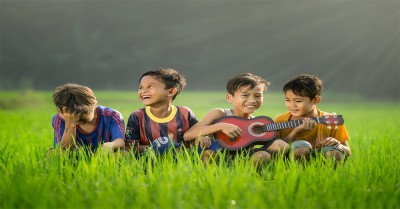
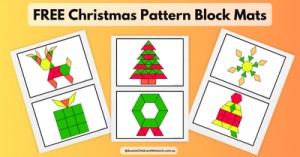

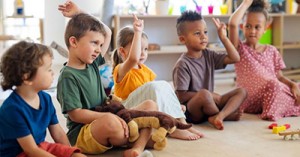
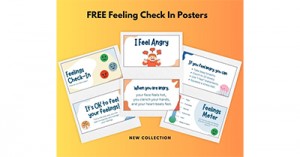
 Open ended questions cannot be responded to with one word answers such as yes or no. These types of questions enables a child to provide
Open ended questions cannot be responded to with one word answers such as yes or no. These types of questions enables a child to provide During your child’s preschool years, an important milestone begins to emerge. This is the development of pre-writing skills. Pre-writing skills are used to encourage, develop
During your child’s preschool years, an important milestone begins to emerge. This is the development of pre-writing skills. Pre-writing skills are used to encourage, develop Open ended materials enables children to play freely. They are objects that have no rules to follow, use or function. Raw materials that can be
Open ended materials enables children to play freely. They are objects that have no rules to follow, use or function. Raw materials that can be An Acknowledgment of the Country is a way of showing respect for the Traditional Owners and can be given by both non-Indigenous people and Aboriginal
An Acknowledgment of the Country is a way of showing respect for the Traditional Owners and can be given by both non-Indigenous people and Aboriginal Language plays an important role in a child’s development. It enables a child to communicate effectively with their family, learn at school, socialize with friends,
Language plays an important role in a child’s development. It enables a child to communicate effectively with their family, learn at school, socialize with friends, Like adults, children have to deal with their own stress in life. Moving house, starting a new school, preparing for a new sibling - these are
Like adults, children have to deal with their own stress in life. Moving house, starting a new school, preparing for a new sibling - these are Playdough is such a versatile material. It provides numerous benefits to children as they manipulate it, it is safe and soothing and provides children with
Playdough is such a versatile material. It provides numerous benefits to children as they manipulate it, it is safe and soothing and provides children with Teaching children about sustainability enables them to appreciate and respect the natural environment. Early childhood services can provide meaningful hand on learning experiences in order
Teaching children about sustainability enables them to appreciate and respect the natural environment. Early childhood services can provide meaningful hand on learning experiences in order Recycling is an important concept that teaches children to care for the environment. It encourages children to be responsible and show a growing appreciating for
Recycling is an important concept that teaches children to care for the environment. It encourages children to be responsible and show a growing appreciating for When children apply paint to paper, glue things together, or pound a lump of clay, they experiment with colour, shape design and texture.
When children apply paint to paper, glue things together, or pound a lump of clay, they experiment with colour, shape design and texture.
